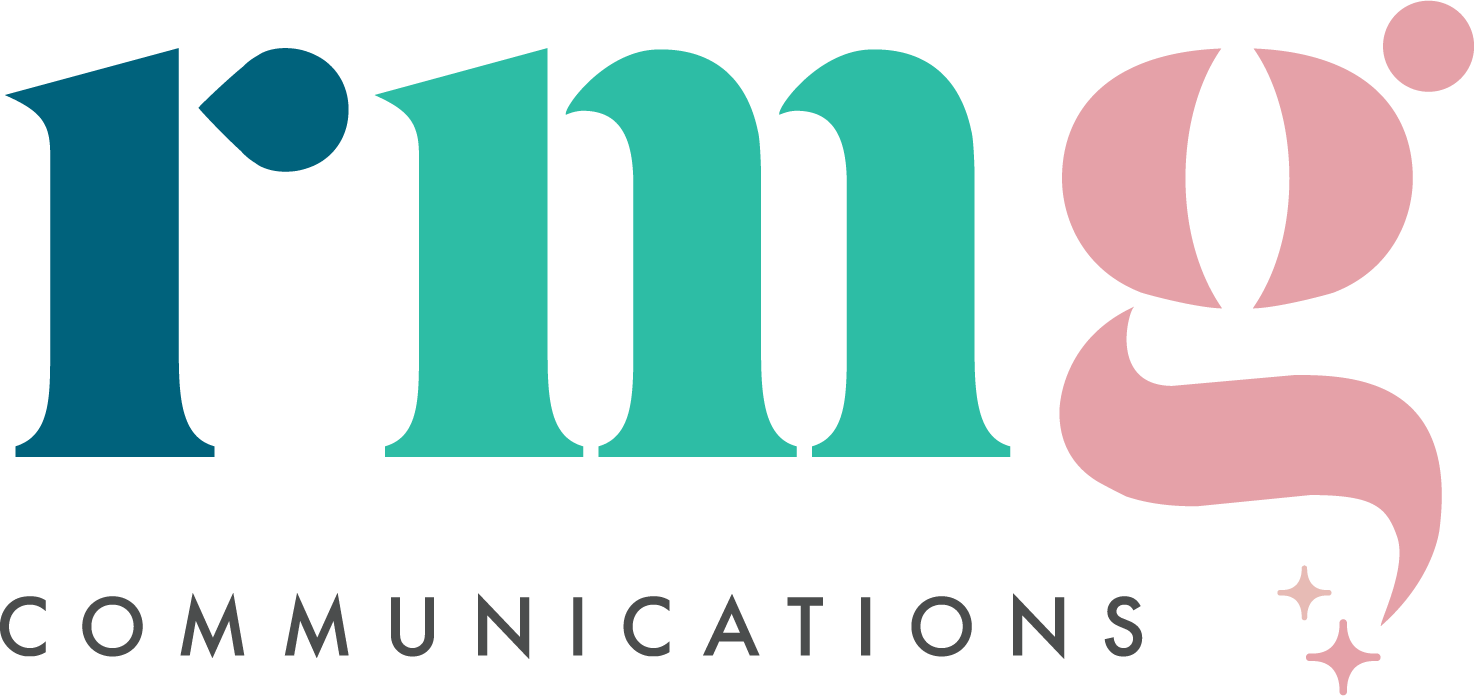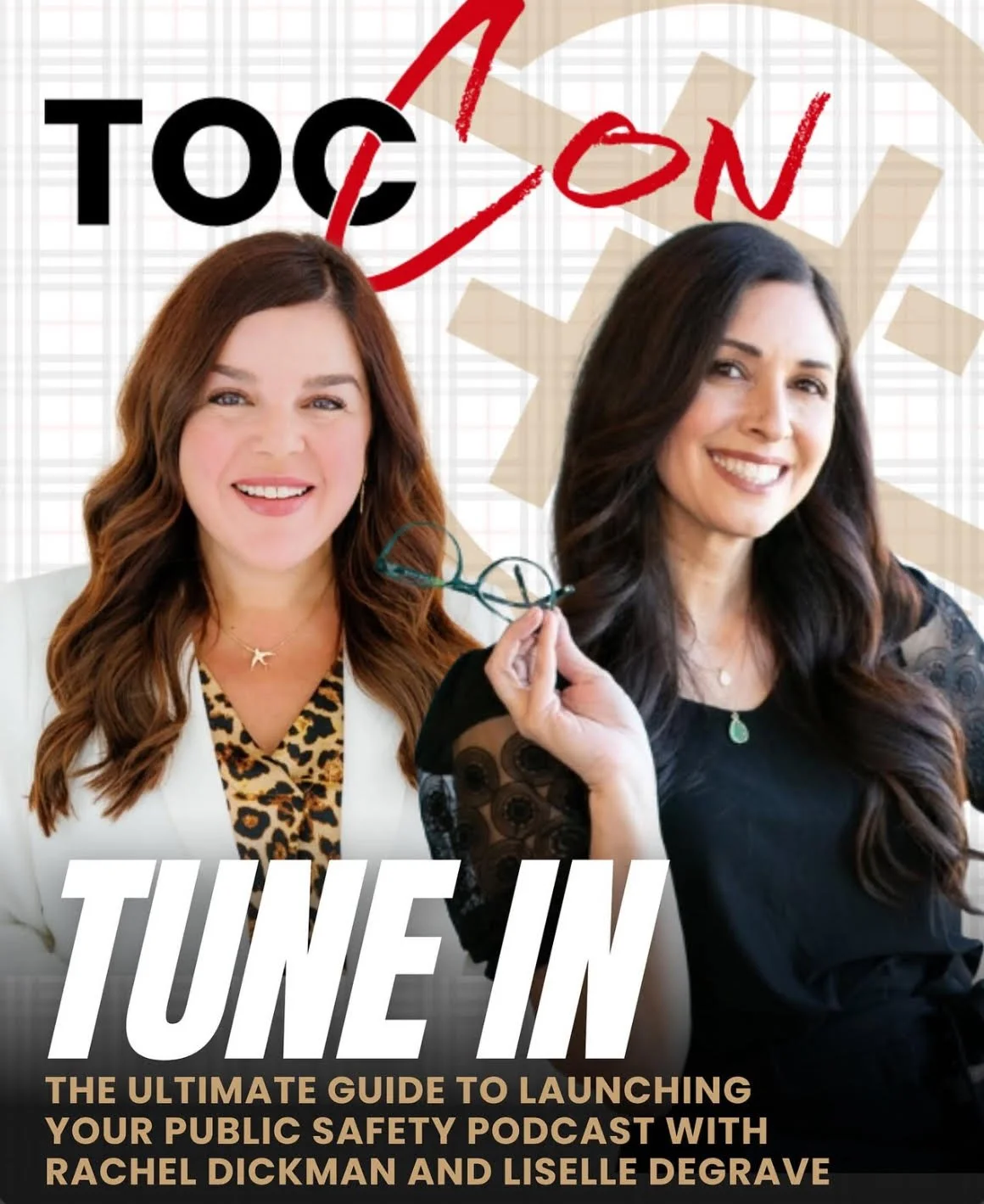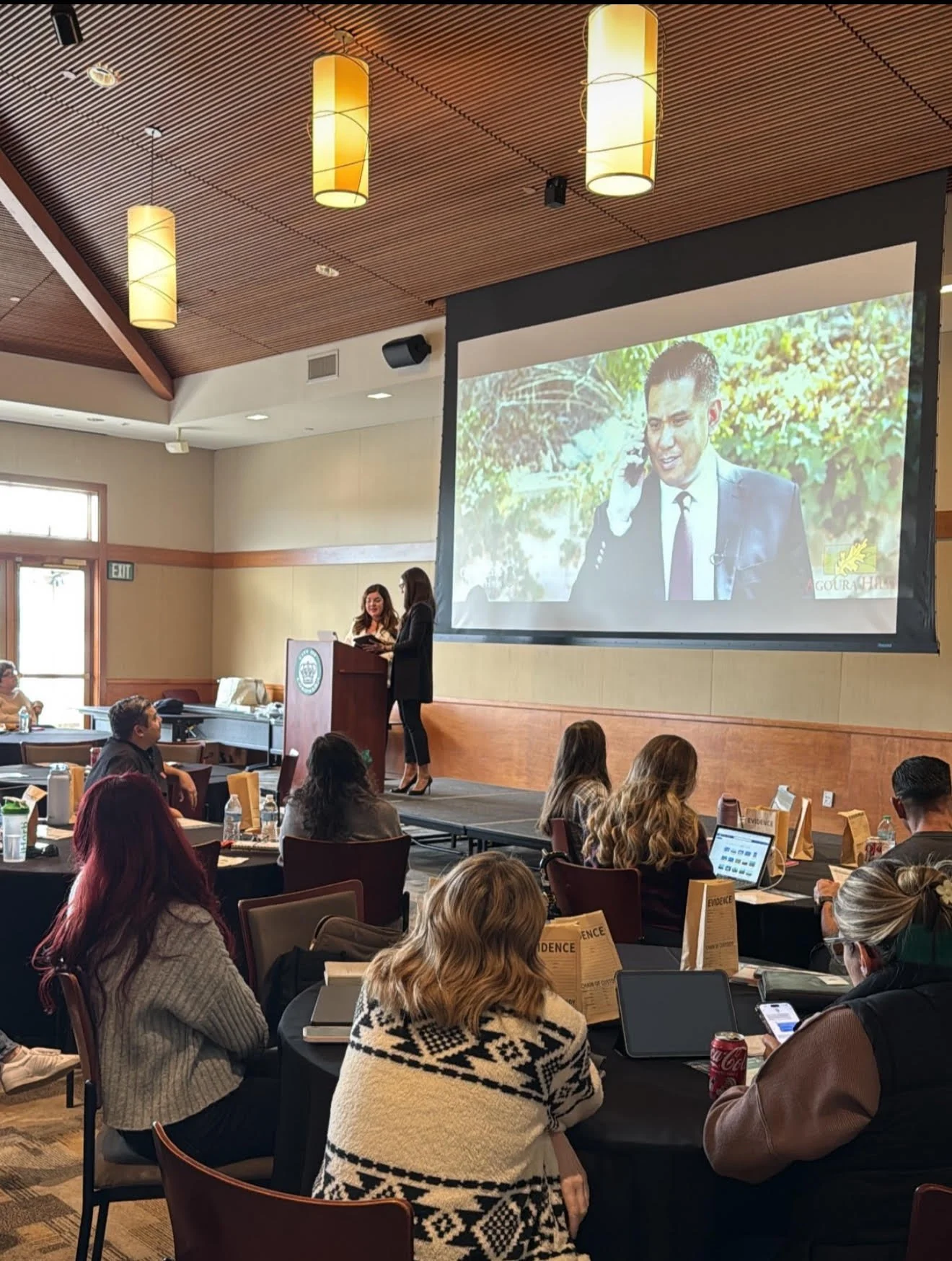How Law Enforcement Agencies Can Launch a Successful Podcast in 2025
By Rachel Dickman, MBA, APR, Founder and CEO, RMG Communications and Liselle DeGrave, APR, President and Founder, DeGrave Communications
At TOC CON 2025, one of California’s premier digital media and communications conferences, we had the opportunity to present to nearly 100 law enforcement and communications professionals on one of the fastest-growing tools in modern public safety communication: podcasting. With more than 100 million people listening to podcasts each month, law enforcement agencies now have a powerful way to connect with their communities in a format that is conversational, accessible, and deeply human.
This guide covers how police departments and public safety agencies can start a podcast, what equipment is needed, how to create a strategy, how to promote episodes, and how to measure community impact.
As longtime public-sector PR consultants and co-hosts of the award-winning PRessing On in Public Relations podcast, we shared key strategies and real-world insights to help agencies launch podcasts that strengthen trust, transparency, and community engagement. The guidance below is based on our TOC CON session and our 2025 Law Enforcement Podcasting Playbook.
Why Podcasting Helps Law Enforcement Build Trust and Strengthen Communication
Podcasting gives law enforcement a unique platform to speak directly to the community in an authentic and relatable way. It humanizes officers, clarifies complex decisions, and provides a place for ongoing dialogue. A public safety podcast supports transparency, community trust, crime prevention education, officer recruitment, crisis communication, community policing, and correction of misinformation.
It also offers a practical advantage for agencies with limited staff time. Podcast content can often replace or supplement traditional community meetings, which require significant planning, staffing, and resources and often draw only a handful of attendees. For many departments, podcasting becomes a more efficient and more accessible way to reach far more people on their own schedules.
This combination makes podcasting one of the most flexible and impactful communication tools available to law enforcement today.
Top benefits of a law enforcement podcast include:
Improving community trust
Strengthening transparency
Reducing misinformation
Expanding digital communication channels
Supporting recruitment
Creating accessible long-form content
Reducing the need for time-intensive in-person meetings
Humanizing the Badge Through Storytelling
One of the most powerful benefits of podcasting is the ability to share real stories from the people behind the uniform. These narratives help residents understand the daily experiences, motivations, and challenges officers face. This can include first-person officer stories, community collaboration interviews, behind-the-scenes looks at investigations, conversations with behavioral health experts, discussions on officer wellness, or reflections on critical incidents.
Storytelling builds empathy, supports community policing goals, and reduces barriers by showing the realities of modern policing.
How Podcasting Improves Transparency and Public Understanding
Many departments struggle to explain the reasons behind policies or decisions, especially those that are complex or frequently misunderstood. Podcasts offer space to break these topics down clearly in a way that traditional media often cannot. Agencies can use episodes to walk through policy updates, discuss technology like body cameras or drones, explain staffing models, and clarify misconceptions. This level of clarity builds trust and reduces misinformation.
Podcasting also gives agencies the ability to communicate in a long-form format, something that social media, websites, and press releases do not typically allow. Longer conversations provide space to share full context, explore the reasons behind decisions, and address nuanced issues in a more natural and human way.
Using Podcasts to Strengthen Public Safety Education
Podcasts are highly effective for communicating safety information, whether departments are educating residents about property crime trends, emergency preparedness, fentanyl dangers, school safety, or mental health resources. Because listeners can tune in at their convenience, podcast content reaches more people than traditional workshops, printed mailers, or community meetings.
This flexibility makes podcasting a valuable tool in crisis readiness, public education, and ongoing digital communication strategies.
How to Create a Law Enforcement Podcast Strategy
Before recording your first episode, departments should develop a clear podcast strategy that outlines goals, audiences, format, cadence, and metrics for success. Key questions include:
What is the primary goal?
Who is the audience?
Will episodes be audio only or video-based?
Is this an ongoing show or a limited series?
How will the agency measure success?
A clear strategy creates alignment, improves long-term consistency, and ensures the podcast serves the department’s mission and community needs.
For examples of broader public-sector communications strategies, readers can explore resources on the DeGrave Communications and RMG Communications websites.
Equipment and Setup: What Agencies Really Need to Get Started
You do not need a studio or high-cost equipment to launch an agency podcast. Many teams are surprised to learn that a simple, budget-friendly setup is enough to produce clear and professional audio. Some of the most effective public-sector podcasts are recorded in everyday spaces such as conference rooms, small offices, or carpeted areas that naturally reduce echo.
A starter kit can include an affordable microphone such as the Samson Q2U or the Shure MV7. Interfaces like the Focusrite Scarlett or the Rodecaster Pro II range from budget to premium and are optional if you choose a USB microphone. Reliable headphones such as the Audio-Technica ATH-M50x or Sony MDR-7506 can last for years. Free or low-cost editing tools including Audacity, GarageBand, Adobe Audition, or Descript make it simple to produce polished episodes.
For agencies that want to feature guests or record interviews from different locations, platforms like Riverside.fm, SquadCast, or Zencastr allow you to capture clear audio from anywhere. With a small investment and a quiet room, any agency can launch a professional podcast without building a studio or purchasing expensive equipment.
Naming, Branding, and Positioning Your Agency Podcast
Your podcast name and artwork greatly influence discoverability. Choose a name that is simple, relatable, and aligned with your department’s mission. Titles like The Briefing Room, Ten-Eight Talks, Community in Focus, or Behind the Badge work well. Before finalizing a title, it is important to check that the name is available and searchable across podcast platforms, social media, and general internet searches to avoid confusion with existing shows.
Artwork should reflect department branding and meet general podcast platform specifications, which typically include a square format, a minimum resolution of 1400 by 1400 pixels, a maximum resolution of 3000 by 3000 pixels, an RGB color profile, and JPG or PNG file formats.
Promotion Tips to Grow Your Law Enforcement Podcast
Promotion is just as important as production. Agencies should build a promotional plan that includes social media posts, newsletters, embedded episodes on the website, short video clips for Instagram or YouTube, and collaborative cross-promotion with guests. Tagging partners, sharing transcripts or captions, and coordinating with schools or nonprofit groups can also expand reach.
Agencies can also seek media coverage by pitching episode highlights or guest interviews to local news outlets.
How to Measure Podcast Success
Measuring performance helps justify the program and refine future content. Quantitative metrics include downloads, subscribers, social media engagement, earned media mentions, and website traffic. Qualitative metrics include community sentiment, listener questions, recruitment outcomes, and staff feedback. Reviewing data regularly ensures the podcast evolves based on community needs.
Privacy, Ethics, and Safety Considerations in Law Enforcement Podcasting
Departments must ensure compliance with legal, privacy, and policy standards. This includes avoiding identifying details in active cases, securing guest releases, using licensed music, storing audio files securely, and following all departmental privacy guidelines. Ethical content builds trust and protects the agency.
Final Thoughts
Podcasting gives law enforcement agencies a powerful way to deepen community trust, increase transparency, and strengthen public understanding. It creates a communication channel that is personal, accessible, and shaped by human connection. Agencies do not need a studio or expensive equipment. They simply need a clear purpose, a consistent voice, and the willingness to speak openly with their communities.
For training, strategy development, or hands-on support launching your agency’s podcast, contact DeGrave Communications or RMG Communications. We are here to help you bring your story to the community with clarity, care, and confidence.


